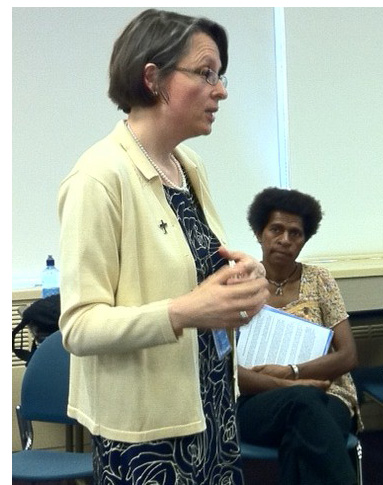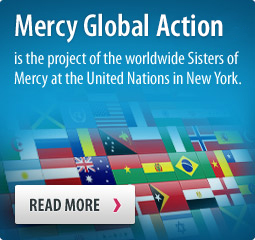
Advocacy for Justice at the United Nations (MGA)
Reports: August 04, 2013
In this last in the series of reflections on the 2013 Mercy Global Action (MGA) Advocacy Experience at the UN, the focus is on the participants’ learnings for their ministry.
Advocacy for justice at the United Nations is advocacy in the spirit – the Spirit of God and the spirit of Mercy.
No one knows this better than those who continue to labor in the arena of advocacy to bring forth the voice of the voiceless, the cry of those who have been silenced by poverty, insecurity, marginalization, and exclusion.
A 2009 theological reflection on advocacy published by the World Council of Churches (WCC) states:
Advocacy is a prophetic activity of the churches, in which we accompany and support our sisters and brothers who struggle mightily for justice and peace in the context of injustice and violence against fellow human beings and the rest of creation. Advocacy involves speaking up for those who are silenced in their efforts to rectify injustice. It demands our engagement with the issues and initiatives of those who struggle for life, justice, equity, rights, and peace. Advocacy is a mission activity of the church in the world.

L-r: Bridget Crisp rsm, Catharine Courtney rsm, Maryanne Kolkia rsm, Betty Lacey, Marianne Comfort
Key contact:
The 2013 MGA Advocacy Experience at the UN provides a model for similar MIA-sponsored future events to engage in prophetic activity. As a result of the UN week, participants reflected on their learnings relative to what the WCC describes as “three major components of the kind of advocacy demanded in these times: praying, speaking out, and acting together.”
Praying
Patricia Fox rsm (ISMAPNG) and Sheila O’Dea rsm (Newfoundland) led the advocates through theological reflection and participants responded with their own insights on personal call, faith sharing, paradigm shifts, and the heritage of Catherine McAuley.
Catharine Courtney rsm (Australia) reflected on a dual call: the people for whom we are advocates call us forth; God calling us forth, mobilizing us to be called out of our comfort zone. She added that there is an urgency for action in situations that cry out for change.
Carmel Bracken rsm (The Congregation) noted that the issues are symptoms and added: “I want to be an advocate – to break open all issues into transformation.” Her sense is that there is a new place of evolution beyond a holding action as we reach the limits and one way that a shift can take place is through tapping creativity.
Patrick Duffy, member of the mission of Ireland to the UN, expressed gratitude for the ministry of people of faith and noted in his conversation with Mercy advocates that religious have indeed educated the world.
Theologian Janet Ruffing rsm (Americas) reminded the participants that the ministry of advocacy is imaging what Christianity must become in order to be faithful to what God wants us to be. As for the arena of the UN, “There is a sense of hope that a free zone like the UN can give, with each nation having a place at the table.”
The participants identified key elements of an advocacy vision as: faith, persistence, vigor, and confidence in God’s faithfulness and promise. The virtue for advocates lies in the root of the word “virtus”, meaning “strength.”
Speaking Out
L-r: (Standing) Áine O’Connor rsm, (Seated) Maryanne Kolkia rsm
Participant Maryanne Kolkia rsm (ISMAPNG) felt encouraged, enabled and empowered to move to the big picture, the global context. She noted that “inviting the Sisters around the globe was a brilliant idea. There is a sense of us being connected and united in Mercy Spirit with passion and hope. That zeal will enable us to take a bold step in responding to our mother earth, the poor and the voiceless at this time. … It was beneficial and vital to see global issues with the eyes of faith.”
Carmela Cabactulan rsm (Philippines) offered the island symbol of a gong calling the community to gather – suggestive of the power of each voice as it comes together with that of others.
Áine O’Connor (MIA NGO Representative) reviewed the role of the Sisters of Mercy at the UN. Venues for speaking out on behalf of Mercy include participation in the work of committees and Commissions, visits to the missions of various member states, written and oral interventions on the floor of the UN, collaboration with other faith-based NGOs – all enriched by collaboration with the family of Mercy throughout the globe whose wisdom and experience are the strongest witness for advocacy at the UN.
Jean Stokan (Americas) concluded that she leaves with a new eye to our work of consciousness-raising, not just educating on issues, but deliberately helping to a cultural shift to the transforming work of infusing compassion into this world; not just hoping for it but building it into action, entering the public discourse with language and concepts like “compassion” and building a “culture of nonviolence.”
Acting Together
A Skype session with members of GRUFIDES in Peru traced the origins of people coming together to oppose unsustainable mining practices. When asked how they continue to hope against hope, the response was loud and clear: solidarity with others around the world to act together and to use the mechanisms of access in all arenas available.
Other presenters from the UN arena enriched the reflection and conversation. Darcey O’Callaghan, International Policy Director of Food and Water Watch, reminded the advocates that UN interventions require country-level advocacy and a grassroots base. Making personal connections, organizing local groups and joining these to each other gather strength to address larger issues. Zelia Cordeiro SSpS, NGO Representative of VIVAT International, explained how to collect grassroots input for documentation and effective impact on policy. Winifred Doherty RGS, NGO Representative of the Congregation of Our Lady of Charity of the Good Shepherd, walked the participants through the various forms of advocacy within the UN and how to access them. Amanda Lyons, Advocacy Officer and Human Rights Attorney for Franciscans International, offered a reflection on the UN Universal Declaration of Human Rights and approaches to using the Declaration in advocacy. Lucy Van Kessel PBVM, Short-term NGO Representative of the International Presentation Association, described how women religious at the UN collaborate for justice. Mary Purcell, Betty Lacey and Carmel Bracken RSM (Ireland) and Jean Stokan (Americas) outlined practical methods and means of advocacy in action.
Finally, participants identified learnings for continuing the ministry of advocacy:
- • Life style is often the cause of the problem.
- • Consciousness-raising is important.
- • The work is local, national and planetary in scope.
- • Keep those without voice at the center.
- • Be strategic.
- • The whole community of life is interconnected, converging.
- • Divine energy is within us.
- • There is a passion, an urgency for change.
- • The heart must be awakened.
- • Great suffering and great hope are coming together.
- • The Holy Spirit teaches us everything we need to know.
These summaries and reflections represent only a sampling of the wisdom of presenters and advocate-participants. Yet they hold great promise for the future of an advocacy based in faith and nurtured by a merging of reflection with action.
The focus issues for MIA Global Action – eradication of human trafficking and promotion of cosmology and eco-justice – create a milieu in which Mercy advocates work to make these voices heard locally, nationally, and internationally. This year’s event, with the support of MIA and Trocaire, has set the stage for future experiences designed to strengthen and expand the network of advocacy worldwide. With theological reflection as context, advocacy can deepen the faith dimension that forms the core of Mercy action.
Messages to: Rita Parks rsm





